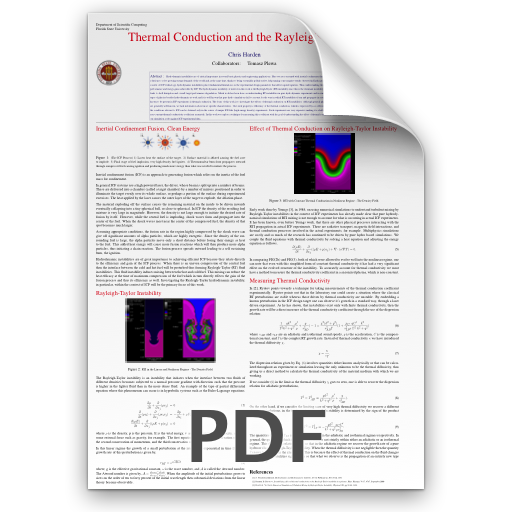
Thermal Conduction and the Rayleigh-Taylor Instability
Abstract
Hydrodynamic instabilities are of critical importance in several basic physics and engineering applications. Here we are concerned with inertial connement fusion (ICF). The ICF is one of the potential solutions to solve growing energy demands of the world and, at the same time, thanks to being essentially pollution-free, help taming some negative trends observed in Earth’s natural environment (global warming). In the context of ICF technology, hydrodynamic instabilities place fundamental limitations on the experimental design parameters that affect capsule ignition. Thus, understanding these instabilities is crucial to improving the performance and energy gains achievable by ICF. The hydrodynamic instability of interest in this work is the Rayleigh-Taylor (RT) instability since this is the dominant instability during the ICF capsule compression and leads to shell disruption and overall target performance degradation. Much work has been done on understanding RT instabilities in pure hydrodynamic experiments and in simulations. In ICF however there are other types of physics besides hydrodynamics at work and it is well known that pure hydro simulations fail to account for the way in which RT instabilities form and propagate in actual ICF experiments. One type of physics known to be present in ICF experiments is thermal conduction. The focus of this work is to investigate the effects of thermal conduction on RT instabilities. Although general physical properties of plasma in that regime are generally well-known, we lack information about more specific characteristics. One such property is efficiency of the thermal conduction, which is expressed by a coefficient of thermal conductivity. Furthermore, the conditions relevant to ICF can be obtained only in the course of unique ICF-like (high-energy density) experiments. Such experiments are very expensive making it a challenge to be able to accurately measure the non-constant thermal conductivity coefficient accurately. In this work we explore a technique for measuring this coefficient with the goal of understanding the effect of thermal conduction on RT instabilities and validating our simulation codes against ICF experimental data.

